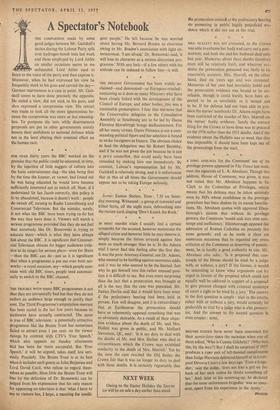A LONG APOLOGIA for the Commons' use of its privilege
powers appeared in The Times last week: over the signature of L. A. Abraham. Though the address, -House of Commons, was given, it was not stated that Mr. Abraham happens to be Clerk to the Committee of Privileges, which means that his defence may be taken seriously even by MPs whose confidence in the privilege procedure has been shaken by its recent humilia- tions. Mr. Abraham quotes with approval Ellen- borough's dictum that without its privilege powers, the Commons 'would sink into utter con- tempt and inefficiency.' Ellenborough opposed the admission of Roman Catholics on precisely the same grounds; and as he made it clear on numerous occasions that he regarded any press criticism of the Commons as deserving of punish- ment, he is hardly a good authority to cite. Mr_ Abraham also asks: 'Is it proposed that con- tempts of the House should be tried by a judge with, or without, a jury? If the former, it would be interesting to know what arguments can be urged in favour of the proposal which could not equally well be adduced in support of a proposal to give persons charged with criminal contempt of court a right to be tried by a jury.' The answer to the first question is simple : trial in the courts, either with or without a jury, would certainly be preferable to trial by a judge who is also prosecu- tor. And the answer to the second question is even simpler : none.


































 Previous page
Previous page